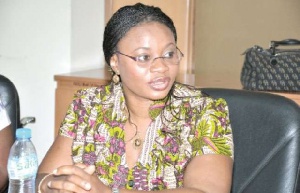Mrs. Charlotte Osei, Chairperson for the Electoral Commission (EC), has expressed concern about the relatively high number of ballot papers that get spoilt during elections and said every effort should be focused on tackling it.
The cause, she said, was not the lack of voter education, as some people would want the nation to accept.
This is because the Commission, which she now heads, together with the National Commission for Civic Education (NCCE), had been carrying out lots of public education and on regular basis to aid voters to properly thumbprint the ballot papers.
Mrs. Osei asked that the issue of rejected ballots be looked at with a more scientific lens to ascertain what the problem really was.
She was speaking at a workshop organized by the Commission in Kumasi with support from the European Union (EU) to educate the voting public on the assembly and unit committee elections.
It brought together civil society groups, community-based organizations, religious groups and the media.
Mr. Samuel Tettey, Director of Elections, said all voters in the upcoming district level polls will have to go through biometric verification before they could cast their ballot.
He pointed out that even where a person’s name is found in the voters’ roll but the device is unable to verify them, they would not be allowed to vote.
Although the biometric machine was “very sensitive” and may fail to recognize some people engaged in vocations that destroy the contours on their fingers and sometimes, those with high temperatures, the “EC’s hands are tied”, he added.
He conceded that the biometric voting system posed challenges but said since the political parties insist that there should be no vote without verification the Commission did not have any option.
He announced that two biometric verification devices would be deployed in each electoral area on the day of the elections with one serving as a back-up.
Mr. Tettey reminded candidates contesting the elections that it was non-partisan and for that matter it was an infraction to use any name, slogan or colour depicting political party affiliation.
He advised the candidates to be bold to report EC officials, who might attempt to extort money from them.
Mr. Paul Boateng, the Ashanti Regional Director, said the EC would continue to educate the public on elections and involve all key stakeholders for the success of all elections in the country.
He urged the electorate to ensure that they voted for not more than one person in the assembly election and not more than five people in respect of the Unit Committee.
Mr. Boateng said the people have a collective responsibility to uphold the integrity of the polls by reporting any electoral offences to the Commissions.
Politics of Thursday, 6 August 2015
Source: GNA

















